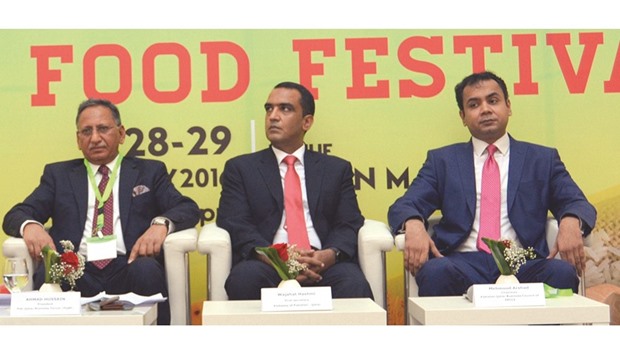“If the world’s peace depended on mangoes, you can rest assured, Pakistan would be one of the go-to countries. The king of all fruits — and probably, even ‘queen’ if Sindhri from the country’s Sindh province is taken into account — does not taste as sweet and succulent anywhere in the world than Pakistan,” Ahmad Hussain, President of Pakistan-Qatar Business Forum (PQBF), said in his opening address at the two-day Pakistan ‘Agro Food Festival’ at Ezdan Mall, Gharaffa.
Themed ‘Taste of Pakistani Delicacies’, the show was jointly organised by Trade Development Authority of Pakistan and Zaoq Restaurants, Qatar, under the umbrella of PQBF.
Held in a festive atmosphere, the event was attended in large numbers and graced by Qatari dignitaries, government officials, Pakistan embassy officials, foreign diplomats, senior officials of catering companies and supermarkets besides importers. Members of PQBF were also present on the occasion.
It was aimed at creating awareness amongst the stakeholders and importers by demonstrating and promoting the quality and taste of Pakistani agro-food products.
A number of major exporters from Pakistan, who are already established entities in GCC, Europe and the US were present on the occasion and displayed their range of products as well as publicity material.
The festival saw dedicated kiosks to enable Business-to-Business (B2B) meetings between prospective customers and exporters from Pakistan. Dominated by mango, rice and meat, the fruit had the easier of other draw, with Hussain explaining to an eager participant why its summer arrival across the globe made headlines: “fertile soil, tropical climate — with plenty of sun — and organic methods of growing”.
“There is a reason why ‘mango diplomacy’ even assumed such a halo — Islamabad manages to keep leaders in important world capitals in good humour thanks to its sweet after-taste. Now, if only disputes could be resolved over a Chaunsa basket,” he suggested.
It was opened to the general public on Friday, where people of multiple nationalities in vast numbers savoured the delights of the Pakistani fruit.
The annual mango production in Pakistan is over 1.8mn tonnes on average with yearly exports reaching 120,000 tonnes. With more than 30 listed varieties, the country remains one of the preferred choices for global
export.
Mehmood Arshad, chairman, Pakistan-Qatar Business Council, an apex body of Federation of Pakistan Chambers of Commerce & Industry (FPCCI), invited potential investors to profit from Pakistan’s rich growth base, citing the surplus citrus chain as an example. He felt Qatar’s proximity to Pakistan in terms of physical reach with a barely two hour-flight meant the access was a huge advantage.
In all the mango hysteria, rice did not lag behind in making an immediate impact — Pakistan is the world’s fourth largest rice exporter, turning 9.1% of the global export last year alone. A few interested consumers after sampling a dish wanted to know how and why Pakistani Basmati rice with a “fine texture, long grain and distinguished taste was so light”. Another enthusiast wished to know how not to lose its taste to spices. The short answer was to be content with the “natural aroma” and not to spice it up, literally! It was explained that the “open secret” lay in the lexicon — “Bas” means fragrance and “mati” queen; in other words, the “queen of rice”!
A pitch was also made for increasing the volume of halal meat given its demand in Qatar and the quality associated with Pakistani livestock. Responding to a question, a Pakistani embassy official informed that the annual trade volume with Qatar was approximately $380mn, of which food component of the export from Pakistan alone was around $80mn, with rice constituting 60% of it.
In response to a poser, the PQBF president trotted out three salient reasons for why Pakistan would hold the potential investor’s interest in Qatar: “One, the consistency in quality and taste; two, affordability since Pakistan is in an advantageously close reach; and three, availability, which in many cases means surplus produce.”

From left: Ahmad Hussain, president of Pakistan-Qatar Business Forum; Wajahat Hashmi, first secretary, embassy of Pakistan; and Mehmood Arshad, chairman of Pakistan-Qatar Business Council of FPCCI, at the event.

